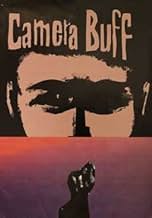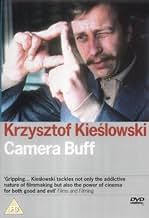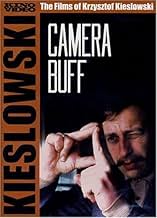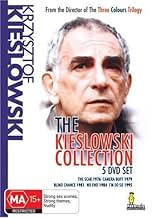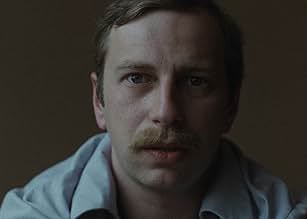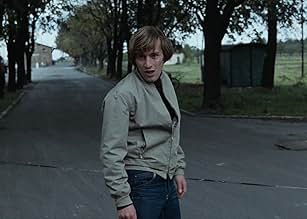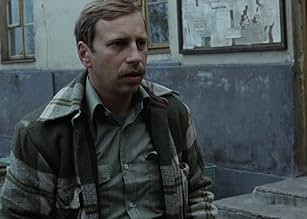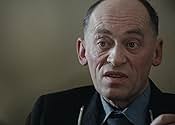CALIFICACIÓN DE IMDb
7.8/10
8.8 k
TU CALIFICACIÓN
Filip compra una cámara cuando nace su primer hijo. Como es el primero en la localidad en tener camara, es nombrado fotógrafo oficial.Filip compra una cámara cuando nace su primer hijo. Como es el primero en la localidad en tener camara, es nombrado fotógrafo oficial.Filip compra una cámara cuando nace su primer hijo. Como es el primero en la localidad en tener camara, es nombrado fotógrafo oficial.
- Dirección
- Guionistas
- Elenco
- Premios
- 6 premios ganados en total
Opiniones destacadas
There are times in our lives that a minor event becomes a biggest event, something that change your life for good or bad, but it's something that makes what you are and defines your whole journey through life. To me this thing was movies. Since I was kid I watched movies but I didn't have a greater perception of what movies were and their meaning, all I know is that I liked for some reason. When I grow older I noticed that is something very important to me and it was something that I couldn't live without, to remember good cinematic moments and to see a different look through our reality, to have different and pleasant experiences.
Since I'm talking about movies and turning points in someone's life, Krzysztof Kieslowski's "Amator" is a brilliant and deep look into the life of a man who accidentally became a filmmaker. Here, Filip Mosz (Jerzy Stuhr) is a happy man that awaits the birth of his first child and he buys a camera to film the event. After that he realizes that he created a magical world through what he filmed, he notices that everything is different, beautiful behind the lens of a camera and starts to make simple documentaries, filming his friends, his neighborhood and everything he finds interesting to film.
But one day someone told to his boss that he has a camera and he needs the camera because the Comunist Party wants to film a celebration of a great event in the town. Since Filip is a State civil servant (working in a factory) he's almost forced to film the event (he's the only person in the whole city to have a 8mm camera). What is interesting here is that Filip enjoyed filming the celebration, doing a great job that caught the attention of his bosses and his friends and that led his film to be registered into a film festival for amateur filmmakers. Filip sudden success makes him moving forward in the making of all sorts of documentaries, one of this documentaries features an midget hard working colleague of Filip in the leading role, something that his bosses doesn't want to be filmed, after all Filip's films are sponsored by the Comunist Party and they don't want to get involved with supposed controversial subjects. Here starts Filip's problems, because now he has a conscience about the power of movies, the influence that his documentaries has in people's lives, in the government, and what it's images may cause to his family and his friends. Is it possible that people can respect and accept what you do even if what you do it's something that pushes away from all the people you love and care? Is Filip a responsible filmmaker or he's just pretending to be someone he's not to get attention? What is best: to be truthful to yourself and lie to others to have good relations or be truthful to everyone and be hated for it? Many questions to be answered by the viewers in this exciting and wonderful film.
Kieslowski knows exactly what's he doing here. This story hands perfectly well to him not only because he's a great artist that deal with many obstacles to make his movies. No, he started filming documentaries,pretty much in what Filip does, filming for the Comunist Party in Poland. In one of the documentaries he accidentally filmed an killing, then his bosses were told and started to control all of his films since then. His first films were censored during the 1970's and beginning of 1980's so in "Amator" we know what he's saying about the control of what filmmakers can do or not. If you are familiar with his first films you can notice that in almost all of it he criticizes the government in one way or another, his attacks are very sharp, very subtle in films like "Bez Konca". With the Trilogy of Colors, "A Short Film About Love" and the "Dekalog" you'll see that he's a more artistic creator. But as in all of his films he's got the partnership of the writer Krzysztof Piesiwicz, a great collaborator.
The acting here is great: Jerzy Sthur in the leading role is awesome. His quietness and strange manners put him in the same type of a Carlitos the Chaplin character, sometimes he's funny, other times he's very impulsive. Malgorzata Zabkowska plays Filip's conflicted wife, a woman that wants the attention of his husband that seems to care more about his movies than to health of his child. In the role of Witek, Filip's best friend and supporter, Tadeusz Bradecki gives a very good performance, showing the limits of what a man can do to a friend and what he won't do. When the movie becomes too slow and sometimes depressive Witek appears to show a little bit of humor.
Another great and reflective work from the fantastic director Kryzsztof Kieslowski, a must see film for those who admires his films, and for those who love movies as I do. 10/10
Since I'm talking about movies and turning points in someone's life, Krzysztof Kieslowski's "Amator" is a brilliant and deep look into the life of a man who accidentally became a filmmaker. Here, Filip Mosz (Jerzy Stuhr) is a happy man that awaits the birth of his first child and he buys a camera to film the event. After that he realizes that he created a magical world through what he filmed, he notices that everything is different, beautiful behind the lens of a camera and starts to make simple documentaries, filming his friends, his neighborhood and everything he finds interesting to film.
But one day someone told to his boss that he has a camera and he needs the camera because the Comunist Party wants to film a celebration of a great event in the town. Since Filip is a State civil servant (working in a factory) he's almost forced to film the event (he's the only person in the whole city to have a 8mm camera). What is interesting here is that Filip enjoyed filming the celebration, doing a great job that caught the attention of his bosses and his friends and that led his film to be registered into a film festival for amateur filmmakers. Filip sudden success makes him moving forward in the making of all sorts of documentaries, one of this documentaries features an midget hard working colleague of Filip in the leading role, something that his bosses doesn't want to be filmed, after all Filip's films are sponsored by the Comunist Party and they don't want to get involved with supposed controversial subjects. Here starts Filip's problems, because now he has a conscience about the power of movies, the influence that his documentaries has in people's lives, in the government, and what it's images may cause to his family and his friends. Is it possible that people can respect and accept what you do even if what you do it's something that pushes away from all the people you love and care? Is Filip a responsible filmmaker or he's just pretending to be someone he's not to get attention? What is best: to be truthful to yourself and lie to others to have good relations or be truthful to everyone and be hated for it? Many questions to be answered by the viewers in this exciting and wonderful film.
Kieslowski knows exactly what's he doing here. This story hands perfectly well to him not only because he's a great artist that deal with many obstacles to make his movies. No, he started filming documentaries,pretty much in what Filip does, filming for the Comunist Party in Poland. In one of the documentaries he accidentally filmed an killing, then his bosses were told and started to control all of his films since then. His first films were censored during the 1970's and beginning of 1980's so in "Amator" we know what he's saying about the control of what filmmakers can do or not. If you are familiar with his first films you can notice that in almost all of it he criticizes the government in one way or another, his attacks are very sharp, very subtle in films like "Bez Konca". With the Trilogy of Colors, "A Short Film About Love" and the "Dekalog" you'll see that he's a more artistic creator. But as in all of his films he's got the partnership of the writer Krzysztof Piesiwicz, a great collaborator.
The acting here is great: Jerzy Sthur in the leading role is awesome. His quietness and strange manners put him in the same type of a Carlitos the Chaplin character, sometimes he's funny, other times he's very impulsive. Malgorzata Zabkowska plays Filip's conflicted wife, a woman that wants the attention of his husband that seems to care more about his movies than to health of his child. In the role of Witek, Filip's best friend and supporter, Tadeusz Bradecki gives a very good performance, showing the limits of what a man can do to a friend and what he won't do. When the movie becomes too slow and sometimes depressive Witek appears to show a little bit of humor.
Another great and reflective work from the fantastic director Kryzsztof Kieslowski, a must see film for those who admires his films, and for those who love movies as I do. 10/10
Krzyszof Kieslowksi begun his career as a documentary film-maker. From the start, he seemed to know two things: that in the shabby, feudal bureaucracy that was communist Poland, everything was political; and that the camera is never truly neutral. It was the second concern that saw him shift into telling fictional, constructed stories; while the first, and his own struggles as a young director, inspired the subject of 'Camera Buff', his first feature. As well as its immediate subject, the film is also a fascinating portrayal of an unfashionable subject, namely the class system, alive and well in the supposed socialist utopia (Kieslowski was a great admirer of Ken Loach, so perhaps we should not be too surprised). The film starts as a black comedy in the manner of the tenth part of his later 'Dekalog', and is both very funny and immediately true to life; as it progresses, it becomes more serious but there isn't quite the emotional intensity that marks his greatest works. The score is also less remarkable than those in the films he made with Zbigniew Priesner, his permanent collaborator from the mid 1980s. But his skill at composing images that are simultaneously profoundly ordinary and starkly arresting is very much in evidence, as is the characteristic sense of an all-pervasive greyness in the lives of his characters, punctured only by shafts of colour when his hapless hero comes into contact with the affluent metropolitan elite. In Dennis Potter's 'The Singing Detective', a central theme is the way that the artist will stop at nothing in using their own life as material, and this is also a theme here, growing in importance as the movie progresses. It's an unusual subject for a debut, and can perhaps be seen as Kieslowski laying his cards on the table before he begun the game. Greatness lay just around the corner.
Jerzy Stuhr buys an 8mm film camera to film his newborn daughter. The manager of the plant he works at hears about it, and tells him to shoot a film about the plant's 25th anniversary. Stuhr figures out the basics of editing, but the director suggests changes he doesn't like. Ignoring this, he takes the film to an amateur festival and wins a prize. As his obsession with film grows, his wife, Malgorzata Zabkowska, suffers postpartum depression, exacerbated by the realization that the things he had once wanted -- her, a daughter, a quiet life -- are no longer his goals.
Krzysztof Kieslowski's third feature is a meditation on the power of film and the inability of a finite work of art to accurately reflect the infinite world, or even the myriad complications of a small town. As Stuhr's skills and connections grow, he comes to see everything through an imaginary camera lens, not seeing anything outside his self-imposed frame. Beautifully shot by five cameramen, dialogue by Stuhr, make this a fine journey of self-discovery.
Krzysztof Kieslowski's third feature is a meditation on the power of film and the inability of a finite work of art to accurately reflect the infinite world, or even the myriad complications of a small town. As Stuhr's skills and connections grow, he comes to see everything through an imaginary camera lens, not seeing anything outside his self-imposed frame. Beautifully shot by five cameramen, dialogue by Stuhr, make this a fine journey of self-discovery.
I really liked this film because it dared to be different and it was an excellent study of psychology. This movie was about a Polish man who scraped together his money in order to by an 8mm camera to film his new baby. However, shortly after getting the camera and beginning filming his wife and child, he gets really hooked on making his little films--and seems to film almost everything around him. At first, it's fun, but then it becomes an obsession. In the process, instead of LIVING and EXPERIENCING life with his little family, he is filming them in a very detached way. However, he is so into the filming that he hardly recognizes his wife's growing anger over that ^&@#*^@! camera! Then, when his boss sees him filming and asks him to make a film for the company, his problem grows by leaps and bounds. He seems to see himself as the next great documentary maker and begins to enter competitions and send his films to the television network. To his wife's chagrin, he receives positive reviews and by this point she's lost him--they have no real life together. Where the film goes from there I will leave for you to watch. It is a fascinating psychological study of a man and his obsession--as well as the impact this ultimately has on others around him. An excellent film.
Filip buys an eight-millimeter movie camera when his first child is born. Because it's the first camera in town, he's named official photographer by the local Party boss. His horizons widen when he is sent to regional film festivals with his first works but his focus on movie-making also leads to domestic strife and philosophical dilemmas.
"Camera Buff" explores censorship in Communist Poland and its repression of the individual's expression of his observations. Filip also confronts the consequences of a man who discovers new possibilities and finds his former world, which had been so fulfilling before he'd discovered filmmaking, rendered dull, old, and limited.
The story is interesting solely because of the Communist aspect. If it was just a story of man who becomes obsessed with making movies, it would be just another story about movies told in the form of a movie. But the Communist aspect? If one man in town has a camera, it suddenly becomes a tool for the entire city. It's interesting. This could be beautiful or ugly, depending on who happens to be in power.
"Camera Buff" explores censorship in Communist Poland and its repression of the individual's expression of his observations. Filip also confronts the consequences of a man who discovers new possibilities and finds his former world, which had been so fulfilling before he'd discovered filmmaking, rendered dull, old, and limited.
The story is interesting solely because of the Communist aspect. If it was just a story of man who becomes obsessed with making movies, it would be just another story about movies told in the form of a movie. But the Communist aspect? If one man in town has a camera, it suddenly becomes a tool for the entire city. It's interesting. This could be beautiful or ugly, depending on who happens to be in power.
¿Sabías que…?
- TriviaThe film's opening scene and Irka's nightmare about a hawk killing a chicken are reminiscent of Ken Loach's Kes (1969) -- a film about a boy who takes to training a wild kestrel in order to escape his troubled life. Later, Filip can be seen reading a filmmaking text and turning to a section about Ken Loach and Kes (1969). This reference is twofold. First, Filip is clearly inspired by filmmakers like Loach in making social realist films about working-class people. Second, Irka is tormented by images mirroring Kes (1969) which represent her husband's budding obsession with this type of filmmaking.
- Citas
Piotrek Krawczyk: [looking at a roll of motion picture film] It's beautiful what you guys do. A person's no longer alive, yet she's still here. It's beautiful.
- ConexionesFeatured in Fejezetek a film történetéböl: A lengyel film (1990)
Selecciones populares
Inicia sesión para calificar y agrega a la lista de videos para obtener recomendaciones personalizadas
- How long is Camera Buff?Con tecnología de Alexa
Detalles
Contribuir a esta página
Sugiere una edición o agrega el contenido que falta

Principales brechas de datos
By what name was El aficionado (1979) officially released in India in English?
Responda

